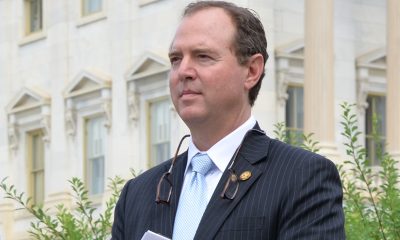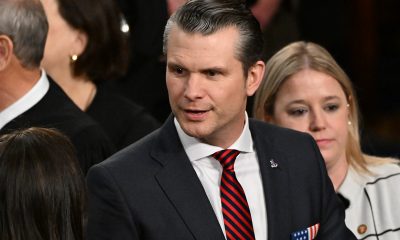National
Report finds limited difficulty in lifting ‘Don’t Ask’
Gates urges Congress to repeal ban by year’s end


Defense Secretary Robert Gates has renewed his call for Congress to repeal "Don't Ask, Don't Tell" by the year's end. (Blade photo by Michael Key)
The Pentagon on Tuesday released its long-awaited “Don’t Ask, Don’t Tell” report — which found open service can be implemented in the armed forces with limited disruption to the military — as Defense Secretary Robert Gates renewed his call for Congress to repeal the gay ban by the year’s end.
“Now that we have completed this review, I strongly urge the Senate to pass this legislation and send it to the president for his signature before the end of this year,” Gates said during a news conference.
Gates continued that legislative repeal of “Don’t Ask, Don’t Tell” is a “matter of some urgency” because of pending litigation that could strike down the statute.
“It is only a matter of time before the federal courts are drawn once more into the fray with the very real possibility that this change would be imposed immediately by judicial fiat — by far the most disruptive and damaging scenario I can imagine,” Gates said.
Still, the defense secretary also said the military would need some time to prepare for open service even after Congress repeals the statute. Gates noted that pending legislation before Congress would end “Don’t Ask, Don’t Tell” only after he, the president and the chairman of the Joint Chiefs of Staff certify that the U.S. military is ready for repeal.
“I believe it would be unwise to push ahead with full implementation of repeal before more can be done to prepare the force — in particular, those ground combat specialties and units for what could be a disruptive and disorientating change,” Gates said.
Gates said he doesn’t know how long it would take for the U.S. military to make the changes necessary before he can certify that open service can happen in the military. Still, Gates said if Congress enacts repeal, President Obama would be “watching very closely that we don’t dawdle or try to slow-ball this.”
“I think his expectation would be that we prepare as quickly as we properly and comprehensively could, and then we’d be in a position to move toward certification,” Gates said. “But how long it would take, I don’t know.”
For the first time, Gates also expressed his personal opposition to “Don’t Ask, Don’t Tell” because the law comprises the integrity of gay service members.
“One of the things that is most important to me is personal integrity,” Gates said. “A policy or a law that in effect requires people to lie gives me a problem.”
Majority of troops don’t care about gays in military
The defense secretary made his remarks as part of his endorsement of the Pentagon report, which found little potential disruption in lifting the military’s gay ban should Congress repeal “Don’t Ask, Don’t Tell.”
Gates said the findings of the report “reflect nearly ten months of research and analysis along several lines of study” and “represent the most thorough and objective review ever of this difficult policy issue and its impact on the American military.”
Chairman of the Joint Chiefs Adm. Mike Mullen, who also took part in the news conference, said he also fully backs the report. Mullen has already testified before the Senate that supports open service in the U.S. military.
“For the first time, the chiefs and I have more than just anecdotal evidence and hearsay to inform the advice we give our civilian leaders,” Mullen said.
In the executive summary for the 256-page report, the “Don’t Ask, Don’t Tell” working group co-chairs Jeh Johnson, the Pentagon’s general counsel, and Army Gen. Carter Ham, commander of U.S. Army Europe, write that based on their findings, the risk of repeal “to overall military effectiveness is low.”
“We conclude that, while a repeal of Don’t Ask, Don’t Tell will likely, in the short term, bring about some limited and isolated disruption to unit cohesion and retention, we do not believe this disruption will be widespread or long-lasting, and can be adequately addressed by the recommendations we offer below,” Johnson and Ham write.
The report includes the results of a survey sent to 400,000 service members over the summer to solicit their views of gays serving openly in the military. According to the report, more than 115,000 of the surveys, or about 28 percent, were returned.
As earlier reported in November by the Washington Post, 70 percent of service members said alongside an openly gay person would have positive, mixed or no effect on their unit’s ability to get the job done.
The survey also found that 69 percent of respondents believe they have served alongside someone they believed to be gay. Of these respondents, 92 percent said their unit’s ability to work together was either very good, good or neither good nor poor.
Still, the survey found a significant minority who predicted negative consequences as a result of repeal — most notably in the Marine Corps.
While 30 percent of survey respondents overall had negative views on open service, around 40 to 60 percent of respondents in the Marine Corps and others in various combat arms specialties expressed concerns about serving alongside openly gay people.
During the briefing, Gates said this discontent with repeal among these groups has made the service chiefs of the Army, Air Force, Navy and Marine Corps “less sanguine” about the prospects on open service. Each of these service chiefs were set to testify on Friday before the Senate on the views on the report.
Still, Gates said the views on the combat troops on implementing open service “do not present an insurmountable barrier” to repeal of “Don’t Ask, Don’t Tell.”
“However, these findings do lead me to conclude that an abundance of care and preparation is required if we are to avoid a disruptive and potentially dangerous impact on the performance of those serving at the tip of the spear in America’s wars,” Gates said.
Implementing open service
Accompanying the larger report is an 87-page support plan to guide implementation of open service in the U.S. military. The guide emphasizes that the key implementation message for successful repeal is “leadership-professionalism-respect.”
For leadership, the guide states that leaders in the chain of command must set the example for open service. For professionalism, the guide advises leaders to remind service members of their obligations and oath to defend the U.S. Constitution. For respect, the guide states that unit strength derives from treating other service members with respect.
The report also notably states the building separate rooming quarters for gay and straight service members won’t be appropriate for implementing open service.
“Building separate facilities would create divisions within units and inappropriately isolate a portion of the force,” the support plan states.
In March, former Marine Corps Commandant Gen. James Conway has raised the idea of separate quarters when he said they might be necessary in his service as a result of open service. The Marine Corps is unique among other services because Marines bunk together on base in the same room.
Despite the recommendation against building separate quarters, Johnson said during the Tuesday news conference that commanding officers may be able to make different housing arrangements from service members as result of open service in some circumstances.
“We’re noting that commanders should retain the discretion on an individualized case-by-case basis to address concerns, particular concerns about privacy,” Johnson said. “And this is discretion they have right now. If a service member has a particular concern about an issue with privacy or can’t get along with someone with whom he’s been assigned a room, a commander has discretion to deal with that.”
The guide also makes recommendations for partner benefits for gays serving in the military. Ham said if “Don’t Ask, Don’t Tell” is repealed, the U.S. military would only to continue to observe federally recognized marriages, which would be in accordance with the Defense of Marriage Act.
Still, Ham said a repeal of “Don’t Ask, Don’t Tell” would mean the same-sex partners of service members would be entitled to hospital visitation rights and death benefits.
“With regard to the hospital visits and death gratuities and the like, if the law is repealed, then we believe that are a number of benefits to which servicemembers are entitled that are servicemember-designated,” Ham said. “And we believe that the examples that you offer would likely fall into that category.”
U.S. Supreme Court
Supreme Court to consider bans on trans athletes in school sports
27 states have passed laws limiting participation in athletics programs

The U.S. Supreme Court on Thursday agreed to hear two cases involving transgender youth challenging bans prohibiting them from participating in school sports.
In Little v. Hecox, plaintiffs represented by the ACLU, Legal Voice, and the law firm Cooley are challenging Idaho’s 2020 ban, which requires sex testing to adjudicate questions of an athlete’s eligibility.
The 9th U.S. Circuit Court of Appeals described the process in a 2023 decision halting the policy’s enforcement pending an outcome in the litigation. The “sex dispute verification process, whereby any individual can ‘dispute’ the sex of any female student athlete in the state of Idaho,” the court wrote, would “require her to undergo intrusive medical procedures to verify her sex, including gynecological exams.”
In West Virginia v. B.P.J., Lambda Legal, the ACLU, the ACLU of West Virginia, and Cooley are representing a trans middle school student challenging the Mountain State’s 2021 ban on trans athletes.
The plaintiff was participating in cross country when the law was passed, taking puberty blockers that would have significantly reduced the chances that she could have a physiological advantage over cisgender peers.
“Like any other educational program, school athletic programs should be accessible for everyone regardless of their sex or transgender status,” said Joshua Block, senior counsel for the ACLU’s LGBTQ and HIV Project. “Trans kids play sports for the same reasons their peers do — to learn perseverance, dedication, teamwork, and to simply have fun with their friends,” Block said.
He added, “Categorically excluding kids from school sports just because they are transgender will only make our schools less safe and more hurtful places for all youth. We believe the lower courts were right to block these discriminatory laws, and we will continue to defend the freedom of all kids to play.”
“Our client just wants to play sports with her friends and peers,” said Lambda Legal Senior Counsel Tara Borelli. “Everyone understands the value of participating in team athletics, for fitness, leadership, socialization, and myriad other benefits.”
Borelli continued, “The U.S. Court of Appeals for the Fourth Circuit last April issued a thoughtful and thorough ruling allowing B.P.J. to continue participating in track events. That well-reasoned decision should stand the test of time, and we stand ready to defend it.”
Shortly after taking control of both legislative chambers, Republican members of Congress tried — unsuccessfully — to pass a national ban like those now enforced in 27 states since 2020.
Federal Government
UPenn erases Lia Thomas’s records as part of settlement with White House
University agreed to ban trans women from women’s sports teams

In a settlement with the Trump-Vance administration announced on Tuesday, the University of Pennsylvania will ban transgender athletes from competing and erase swimming records set by transgender former student Lia Thomas.
The U.S. Department of Education’s Office for Civil Rights found the university in violation of Title IX, the federal rights law barring sex based discrimination in educational institutions, by “permitting males to compete in women’s intercollegiate athletics and to occupy women-only intimate facilities.”
The statement issued by University of Pennsylvania President J. Larry Jameson highlighted how the law’s interpretation was changed substantially under President Donald Trump’s second term.
“The Department of Education OCR investigated the participation of one transgender athlete on the women’s swimming team three years ago, during the 2021-2022 swim season,” he wrote. “At that time, Penn was in compliance with NCAA eligibility rules and Title IX as then interpreted.”
Jameson continued, “Penn has always followed — and continues to follow — Title IX and the applicable policy of the NCAA regarding transgender athletes. NCAA eligibility rules changed in February 2025 with Executive Orders 14168 and 14201 and Penn will continue to adhere to these new rules.”
Writing that “we acknowledge that some student-athletes were disadvantaged by these rules” in place while Thomas was allowed to compete, the university president added, “We recognize this and will apologize to those who experienced a competitive disadvantage or experienced anxiety because of the policies in effect at the time.”
“Today’s resolution agreement with UPenn is yet another example of the Trump effect in action,” Education Secretary Linda McMahon said in a statement. “Thanks to the leadership of President Trump, UPenn has agreed both to apologize for its past Title IX violations and to ensure that women’s sports are protected at the university for future generations of female athletes.”
Under former President Joe Biden, the department’s Office of Civil Rights sought to protect against anti-LGBTQ discrimination in education, bringing investigations and enforcement actions in cases where school officials might, for example, require trans students to use restrooms and facilities consistent with their birth sex or fail to respond to peer harassment over their gender identity.
Much of the legal reasoning behind the Biden-Harris administration’s positions extended from the 2020 U.S. Supreme Court case Bostock v. Clayton County, which found that sex-based discrimination includes that which is based on sexual orientation or gender identity under Title VII rules covering employment practices.
The Trump-Vance administration last week put the state of California on notice that its trans athlete policies were, or once were, in violation of Title IX, which comes amid the ongoing battle with Maine over the same issue.
New York
Two teens shot steps from Stonewall Inn after NYC Pride parade
One of the victims remains in critical condition

On Sunday night, following the annual NYC Pride March, two girls were shot in Sheridan Square, feet away from the historic Stonewall Inn.
According to an NYPD report, the two girls, aged 16 and 17, were shot around 10:15 p.m. as Pride festivities began to wind down. The 16-year-old was struck in the head and, according to police sources, is said to be in critical condition, while the 17-year-old was said to be in stable condition.
The Washington Blade confirmed with the NYPD the details from the police reports and learned no arrests had been made as of noon Monday.
The shooting took place in the Greenwich Village neighborhood of Manhattan, mere feet away from the most famous gay bar in the city — if not the world — the Stonewall Inn. Earlier that day, hundreds of thousands of people marched down Christopher Street to celebrate 55 years of LGBTQ people standing up for their rights.
In June 1969, after police raided the Stonewall Inn, members of the LGBTQ community pushed back, sparking what became known as the Stonewall riots. Over the course of two days, LGBTQ New Yorkers protested the discriminatory policing of queer spaces across the city and mobilized to speak out — and throw bottles if need be — at officers attempting to suppress their existence.
The following year, LGBTQ people returned to the Stonewall Inn and marched through the same streets where queer New Yorkers had been arrested, marking the first “Gay Pride March” in history and declaring that LGBTQ people were not going anywhere.
New York State Assemblywoman Deborah Glick, whose district includes Greenwich Village, took to social media to comment on the shooting.
“After decades of peaceful Pride celebrations — this year gun fire and two people shot near the Stonewall Inn is a reminder that gun violence is everywhere,” the lesbian lawmaker said on X. “Guns are a problem despite the NRA BS.”
-

 U.S. Supreme Court2 days ago
U.S. Supreme Court2 days agoSupreme Court to consider bans on trans athletes in school sports
-

 Out & About2 days ago
Out & About2 days agoCelebrate the Fourth of July the gay way!
-

 Maryland5 days ago
Maryland5 days agoSilver Spring holds annual Pride In The Plaza
-

 Opinions5 days ago
Opinions5 days agoSupreme Court decision on opt outs for LGBTQ books in classrooms will likely accelerate censorship












